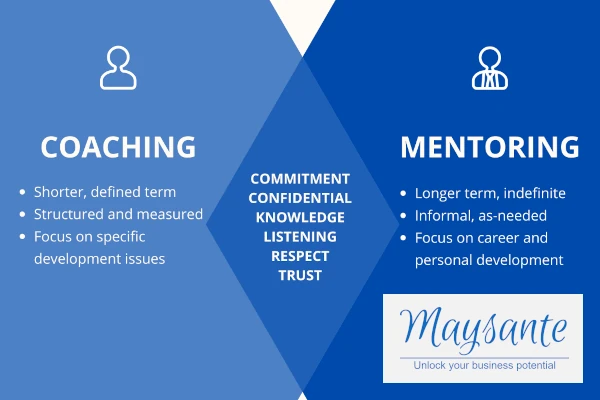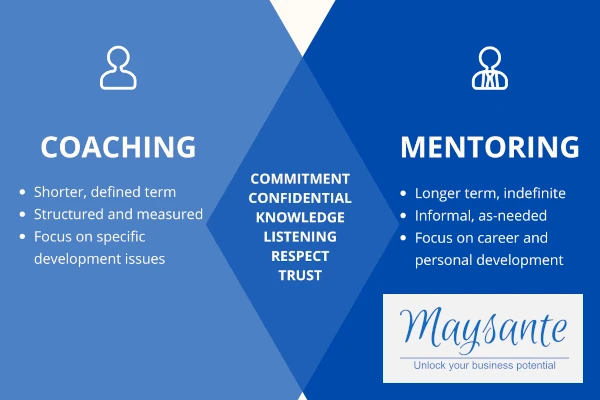Coaching versus mentoring bears the question of whether you need a coach or a mentor depending on what your goals are. The reality is that most people will use a mixture of coaches and mentors throughout their careers. Working with a coach can help you focus on your goals. Coaching will also make you more accountable. Mentoring is good for honing in on your skills, learning from an experienced professional in your field. Coaching tends to be a formal arrangement between the coach and the client. Whilst mentoring can be formal or informal.
Definitions for Coaching and Mentoring
Coaching: Coaching is an inspiring and creative process through which a coach provides guidance to their client on their goals and maximise their potential.
Mentoring: Mentoring is the process through which a mentor shares their knowledge, skills and/or experience, to help their mentee develop and grow.
Similarities and Differences
Both coaches and mentors need a similar skill set. The ability of the coach or mentor to use their experience and knowledge to help their client or mentee. Coaching and mentoring are both developmental tools that individuals can rely on to achieve their career and personal goals. For both coaching and mentoring relationship to work, there is a need for a higher degree of trust, respect and confidentiality. The coaching client or mentee needs to commit and engage.
They differ in approach and outcome. Coaching will get the individual to reflect and focus on specific developmental needs, helping them to achieve their potential. Coaching helps clients to develop self-awareness and impact awareness, leadership and management skills that help the client achieve transformational and behavioural change. A coach does not need to have direct experience of the client’s role.
Mentoring provides direction, instructions and resources to help the mentee with their career and personal development. Mentors typically act as role models for mentees. Mentors often have a similar professional background to the mentee.

When to use a Coach
- Preparation for role/ career changes and joining the board
- Methods of managing stress, change, conflict and crisis
- Enhancing personal impact and performance
- Identifying solutions to specific work-related issues
- Increasing openness to personal learning and development
- Assisting leaders to lead business transformation
- Assisting leaders who are struggling to deliver against goals and expectations
- Enhancing credibility
- Developing newly appointed leaders and executives
- Enhancing the skills of experienced leaders
Read this blog for the benefits of executive coaching.
When to use a Mentor
- Acquiring knowledge from more experienced professionals
- Motivation to focus on your career and personal development
- Developing and strengthening relationships within organisations
- Enhance career opportunities and prospects within an organisation
- A tool for successful planning and talent development
Key to Successful Coaching or Mentoring Relationship
• Good chemistry and rapport between the coach/mentor and client/mentee
• Establish clear rules of engagement right at the start of the relationship
• Effective communication
• The coach or mentor needs to be a great listener
• The client or mentee needs to be a willing participant or buy into the programme
• Set of goals to achieve
• Agree on actions for the client or mentee to focus on and work on
• Evaluate and review progress

